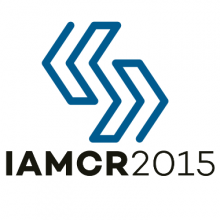
The Public Service Media Policies Working Group invites submissions for its open sessions at the IAMCR annual conference that will be held at Montreal, Canada July 12-16, 2015.
Conference theme: “Hegemony or Resistance? The Ambiguous Power of Communication”
See the conference key dates and deadlines: http://iamcr.org/congress/montreal2015-keydates
See all Calls for Papers for IAMCR 2015: http://iamcr.org/congress/montreal2015-cfp
Visit the conference website: http://congresiamcr.uqam.ca
Established public media provisions are under threat for two reasons: one the one hand, media convergence in digitized mediascapes has changed the competitive environment to such a degree that their services are questioned and moreover less retrievable in an abundance of media offers. On the other hand they are in danger of losing their legitimacy and support in the public sphere and the political domain if they cannot demonstrate their indispensability due to their truly distinctive content and services. Public service broadcasting and its media platforms are running the risk of becoming less relevant, if they do not adequately respond to the changing societal environments. While effects of the crises might result in a further disintegration of multiform societies, new interpretations of the public remit with respect to the value of public quality -- and with it, demographic, issue, and source diversity -- could be able to mitigate these effects of the crises. In other words, new strategies will need to keep the right balance between the catering for large audiences and fragmented ones at the same time.
This year’s conference theme ‘Hegemony or resistance? The Ambiguous Power of Communication’ offers an excellent context and also a possible way-out for these strategic dilemmas of public service providers. In a globalizing world and amidst an abundance of commercial media supply, public service providers will obtain an ever more crucial assignment to care about the national and cultural heritage of nation-states and also to cater for original, high quality, national, cultural and/or community, not-for-profit, oriented content, especially in smaller states and language communities whose media markets are too small to adequately balance the influx of global players and commercialized content. The host country Canada has a fine tradition, also due to its geographical location, of such national cultural policies to countervail the hegemony of global and corporate media markets, but it also has the experience that there are no easy solutions here. Now that such strategies vis-à-vis old and new hegemonic forces – from Hollywood to Silicon Valley -- become more relevant for public service providers all over the globe, the organizers of this Working Group welcome contributions that fit into this theme. The conference theme thus provides an excellent lens for thinking through contemporary transformations in governance models, and state-market-civil society-relations with a focus on the ways in which public service media can successfully resist to and cope with the above-mentioned challenges.
Theme-related questions of particular interest from a public service media policy perspective include:
- How do cultural, media and diversity policies of governments steer creative thinking and innovative reflection as well as its implementation on public service media platforms?
- How are media regulation and policy-making, both at the national and regional levels, affecting public service media remits and practices?
- How do laws, regulations, and policies affect or even stimulate collaboration between public service media and cultural institutions as well as other relevant public and private actors with a view to achieve these culture-building goals?
In addition to and/or in articulation with the conference sub-themes, the Public Service Media Polices Working Group also welcomes theoretical or empirical submissions on:
- The Internet and social media as public service media platforms
- Audiences and public service media content
- Journalism and public service media goals
- Privacy and public service media
- Public service media and responsibility: e.g., reporting on vulnerable groups, victims, children, disabilities
- Public service media and issues of diversity, gender, and age representation
- Media capital and financial means for public service media platforms
- Public interest and public value: for whom?
- Media policy and regulation and their impact on public service media provision
- Media, citizenship, democracy and the role of public service media
- Creative industries and public service media
- Public service media’s coping strategies with on-going crisis
- Public service media and the voices from the OccupyWallStreet, Arab Spring and Indignados movements around the world (Brazil, Colombia, Greece, Mexico, Spain, Turkey, etc.) as counter-hegemonic social agents
Submission format
Abstracts should range between 300 and 500 words in length including the research objectives, theoretical framework and methodology. Each proposal must include title, name(s), affiliation, institutional address and email addresses of the author(s). All abstract submissions must be made centrally via the IAMCR Open Conference System (OCS) available for abstract submission at http://iamcr-ocs.org.
Paper Submission
Early submission is strongly encouraged. Individuals may submit 1 abstract (paper) per Section or Working Group as lead author, and a maximum of 2 abstracts (papers) to a single IAMCR conference in general.
Panel Submission
Panels are for 90 minutes. A complete panel proposal will include:
- The panel description, including, the panel title, a framing text, the names of the panelists and the titles of their papers. The framing text (maximum 350 words) should contain the overall idea and goal of the panel. A panel chair and a discussant should also be proposed.
- An abstract for each paper, including title and author(s). Abstract submissions must include the words PANEL PRESENTATION in their title and the complete title of the panel in the first line of the abstract
This working group accepts abstracts in English or French, and will arrange for presentations in both languages.
Public Service Media Policies Working Group
Chair:
Jo Bardoel
University of Amsterdam/Radboud University Nijmegen, The Netherlands
Vice Chair:
Leen d’Haenens
KU Leuven, Belgium
See the conference key dates and deadlines: http://iamcr.org/congress/montreal2015-keydates
See all Calls for Papers for IAMCR 2015: http://iamcr.org/congress/montreal2015-cfp
Visit the conference website: http://congresiamcr.uqam.ca